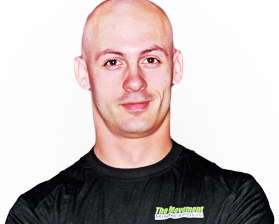
Recently I was talking with my wife, Jen, and I had mentioned that my friend Robb Wolf was sending over an early copy of his next book about food and the brain, and Jen asked “Is Robb still pretty big on low carb/ketogenic diet?”For those of you who may not be familiar the basic idea between very low carb and/or ketogenic diets is that the body absolutely needs fats and protein to sustain function, but can actually function quite well without really any carbohydrates. In the literature low carb diet can mean an amount that is actually relatively high, so when we talk about low carb in this context we’re talking under 50 grams per day. Going under that floor will put the body in a state called ketosis where the body will generate fuel for the brain from fat. Suffice to say you also eat a ton of fat to make up for the calories you’re not getting from carbs.
I’m not going to get into all the pros and cons of ketogenic diets because that’s not the point at all. Suffice to say low carb made a big splash a few years ago and has since faded in popularity, as diets often do.
The rub is this: The preponderance of scientific evidence that we currently have says that ketogenic diets may be interesting for some very specific indications (such as epilepsy) but that it is absolutely crap for high performance athletics or sport.
This is important to understand. As of what we know right now there isn’t a credible sports physiologist or nutritionist in the world who would recommend that any athlete who wants to be able to perform at the highest possible output go on a low carb diet.
However. And this is the big BUT. It seems like there might be some people out there who actually CAN perform extremely well on low carb diet. Even at high demands and intensities of exercise where normally carbs are essential to generating and maintaining output.
But the data hasn’t caught this, and what I think is most important for you to understand is that it may never.
The scientific approach is not intended to and can not give us “answers” or end points. It doesn’t work that way. Science works in averages, probabilities, and standard deviations. In fact, in a sense it doesn’t even tell us anything about YOU. It tells you about what was or wasn’t true about some other group of people, and the likelyhood that it applies to you.
What is supported by the bulk of current evidence should be thought of as a best practice or a starting point.
So if you’re going to figure out how to eat to win at your athletics, you’d be best served by starting with a moderate to high carbohydrate diet.
However, if in doing your own n=1 (the number of participants in the study equals one, you) experiments you do an experiment to try a low carb diet and you find that you are able to maintain or even improve performance then you would be an absolute fool to go back to your high carb diet because “science says this is correct.”
The ultimate science experiment is that one you run on yourself to get your own ever-changing answers.
Which brings us back to my friend Robb. Yeah, he’s a pretty big advocate of Paleo and low carb diets, but he recognizes that individuality and context is king and acknowledges that it might not be ideal for everyone. He knows he actually performs better on low carb diets, and that some people will perform poorly on low carb diets so they shouldn’t use them.
Bottom line is this: Use the scientific literature to figure out where to start when you don’t otherwise know, but don’t get hung up on it, because you may be the outlier they tossed out of the data.


Leave a Reply
You must be logged in to post a comment.